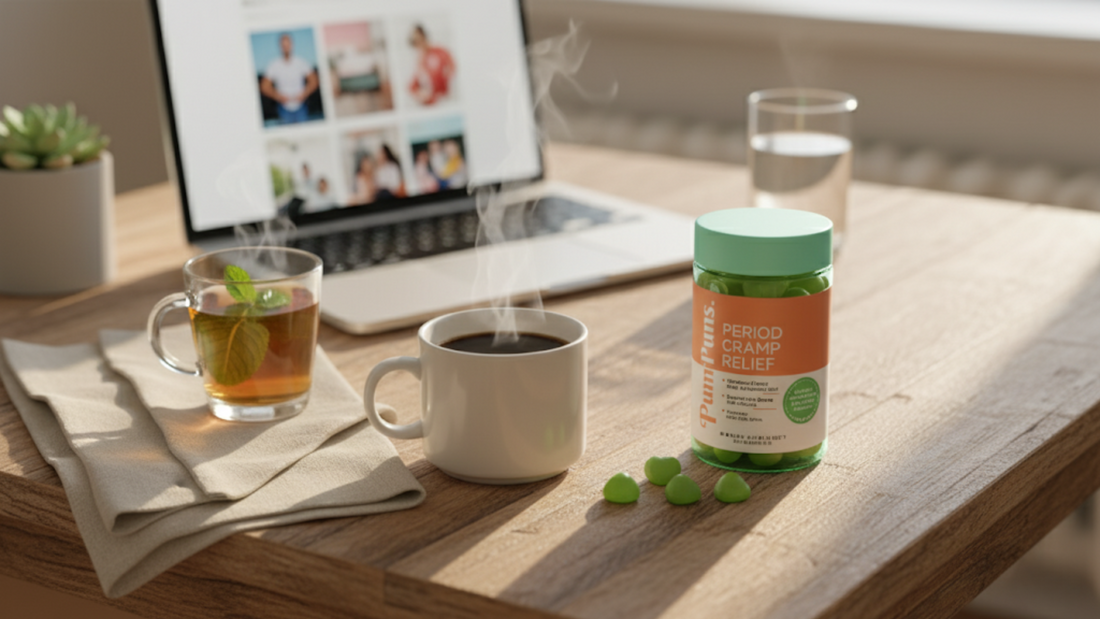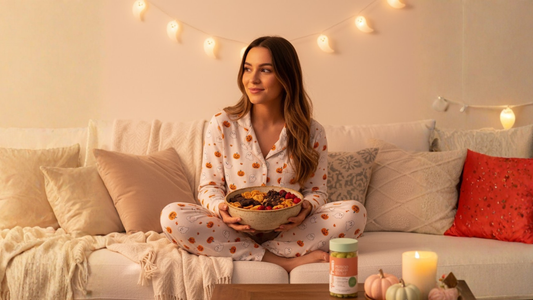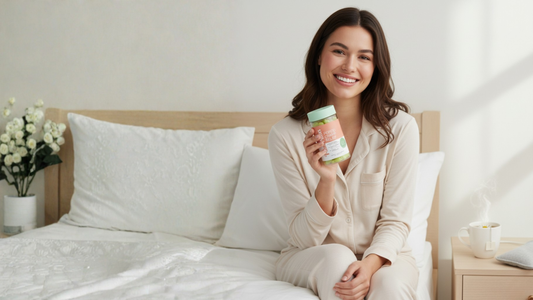
What to Avoid During Periods for Better Relief and Comfort
Share
Foods and Habits to Avoid During Your Period Naturally
During menstruation, it’s best to avoid processed foods high in salt and sugar, excessive caffeine, alcohol, and habits that put extra stress on the body. These choices can increase cramps, bloating, fatigue, and mood swings. Research from the Mayo Clinic, Harvard Health, and PubMed highlights how diet, stress, and sleep directly affect menstrual health. Small adjustments to routine can ease discomfort, especially when combined with natural support like PumPums Menstrual Relief Gummies.
What Foods Should You Avoid During Your Periods To Reduce Pain And Bloating?
Certain foods make cramps, bloating, and fatigue worse:
- Processed: Takeout and canned snacks tend to be high in salt, which causes water retention.
- Sweet foods: Sweets and sodas cause blood sugar highs, which result in crashes that make fatigue and crankiness worse.
- Fried and fatty foods: These are inflammatory foods, and inflammation has been linked with heavier period pain.
- Caffeinated beverages: Excessive coffee or energy drinks will cause more cramps and insomnia.
- Alcohol: Low consumption will dehydrate the body and aggravate headaches.
Whole grain foods, greens, fruits, and foods rich in magnesium, such as nuts, on the other hand, facilitate a smoother cycle.

How Does Caffeine Make Period Symptoms Worse, And What Should You Drink Instead?
Harvard Health states that caffeine constricts blood vessels and overexcites the nervous system. This can:
- Cut off blood flow, making cramps worse.
- Make people more anxious or restless.
- Interrupting deep sleep that regulates hormones.
People often report that replacing some cups of coffee with green tea, ginger tea, or chamomile tea gives more consistent energy and calm.
Why Should You Avoid Alcohol During Your Period To Support Hormonal Balance?
Alcohol may interfere with hydration and hormone balance, CDC data show. Consuming alcohol during a cycle may:
- Contribute to dehydration and worsen cramps.
- Worsen mood swings and drowsiness.
- Trigger headaches or migraines occur in susceptible individuals.
- Avoiding alcohol during menstruation tends to improve hydration and stabilize energy.
What Daily Habits Should You Avoid During Periods For Better Relief?
Apart from food, some habits regulate the intensity of symptoms. Avoid the following habits:
- Skipping meals: It causes irregular blood sugar and aggravates fatigue.
- Poor sleep: Less than seven hours of sleep upsets hormone balance and aggravates PMS.
- High stress: Infrequent increases in cortisol cause cramps and mood swings to be more apparent.
- Over-exercising: Demanding exercise can potentially generate inflammation and soreness.
Gentle exercise, such as walking, stretching, or yoga, makes most women feel more supportive during this time.
Should You Avoid Certain Medications During Your Period Without Guidance?
While many over-the-counter options help, some may not be ideal during menstruation:
- Excess aspirin: May increase bleeding for some individuals.
- Unsupervised herbal remedies: Certain herbs can interact with prescriptions or affect hormones.
The Mayo Clinic notes that NSAIDs such as ibuprofen are generally safe when used correctly to reduce cramps. It’s best to consult a healthcare provider before starting anything new.

What Drinks Should You Avoid During Periods To Reduce Cramping And Fatigue?
Some drinks can worsen bloating and low energy:
- Sugary sodas: Lead to water retention and energy dips.
- Energy drinks: Contain high caffeine and sugar, which can increase irritability.
- Alcohol: As noted, it contributes to dehydration and fatigue.
Better choices include water, coconut water for electrolytes, or calming teas like chamomile and ginger.
How Does Stress Worsen Menstrual Cramps, And Why Should You Avoid It?
Stress plays a major role in menstrual discomfort. PubMed studies show that cortisol, the stress hormone, can:
- Delay or disrupt the menstrual cycle.
- Intensify cramps, headaches, and PMS.
- Lower sleep quality makes fatigue worse.
Simple relaxation habits such as deep breathing, journaling, or short walks can reduce stress and help regulate cycles.
A Subtle Example Of Avoiding Triggers And Supporting Relief With PumPums
It’s common to see the difference small choices make during menstruation. Someone who relies on coffee and processed snacks during their cycle may notice stronger bloating and cramps. When those foods are reduced and replaced with lighter meals, hydration, and plant-based support like PumPums Menstrual Relief Gummies, the overall experience often becomes more manageable. These kinds of shifts reflect both what research suggests and what many people report—symptoms tend to improve when avoidable triggers are minimized.
What To Avoid During Periods For Comfort And Relief With PumPums
- Processed, salty, and sugary foods
- Excess caffeine or alcohol
- Skipping meals or lacking sleep
- High stress and over-exercising
- Aspirin overuse or unverified supplements
Supporting the body with hydration, balanced meals, stress management, and natural products like PumPums Gummies can ease discomfort and promote a healthier monthly routine.



